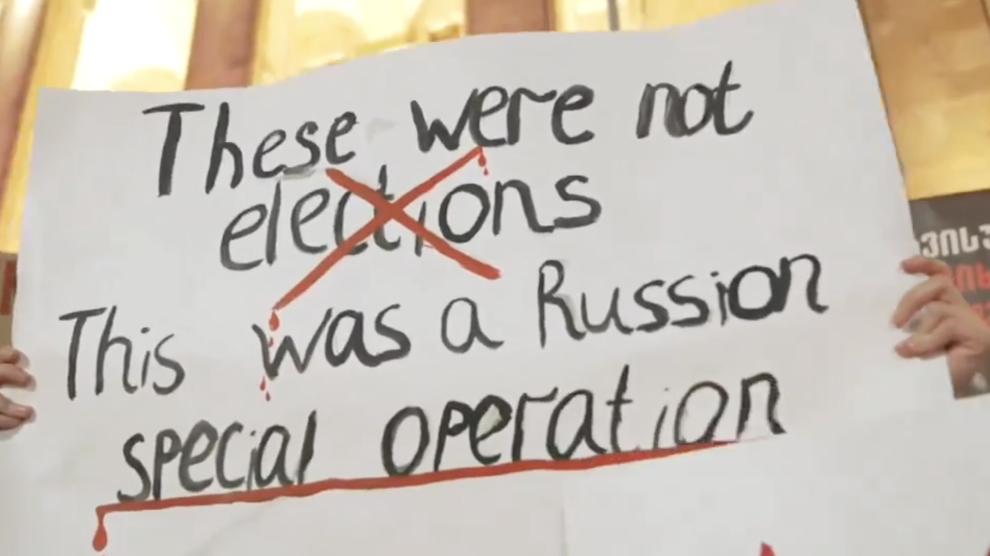Growing street protests, heightened interest from Western partners, and the president’s implicit support, could push Georgia toward a challenging yet transformative new chapter.
The ruling Georgian Dream (GD) party claimed over half the vote and declared victory in Georgia’s historic elections on October 26, while the country’s pro-Western president Salome Zourabichvili called the outcome a ‘Russian special operation’ and encouraged opposition parties not to recognise the results.
However, while international observers and civil society have pointed to extensive evidence of election manipulation, intimidation, bribery, and misuse of administrative resources, the opposition’s own failings also played a significant role in this outcome.
- Fundamental choices at the polls for Georgia and the United States
- Why LGBTQIA+ Georgians are forced to stay silent
- Georgia: War or peace?
An overwhelming majority of Georgians still aspire to join the EU and align with the West. This election result doesn’t change that. But voters making their choices at the polls have seen the horrors of war up close, and not just once. Georgian Dream skillfully exploited these fears and linked them to anti-Western narratives. Meanwhile, the opposition didn’t just appear weak, it seemed ignorant of the power of this strategy.
The opposition in Georgia seemed content to rely on the public’s pro-Western sentiments, assuming it was a perfect rallying point. But this narrow focus left a void: a lack of real debate, context, and healthy political process.
The political elite still haven’t recognised that today’s Georgia isn’t the same post-Soviet nation of the early 2000s, eager to rally around a single charismatic leader. Georgians longed for a power they could vote for not simply to oppose the government, but because they genuinely believed in their vision. That vision, however, was nowhere to be found.
Relying solely on the message that Georgian Dream was steering the country away from the EU wasn’t enough for the opposition. Thanks to missteps by Western allies, this connection was already fraying. Granting Georgia EU candidacy in 2023 proved short-sighted. That became clear when, just a year later, GD doubled down on democratic backsliding by pushing through the foreign influence law and anti-LGBT+ measures, which led the EU to suspend Georgia’s accession process.
Meanwhile, the GD government continues trying to sell EU candidacy as a victory, convincing citizens they can navigate this path while continuing their harmful practices and still win Western favour.
The West’s pivotal role
Adding to this narrative is a strong propaganda campaign which demonises other powers, portraying proximity to the West as a threat to Georgia’s stability and claiming GD is safeguarding the nation from conflict like that in Ukraine. Then there is stable economic growth, at least on paper, and all of this leads to the reality we face.
Many are now asking whether domestic and local expectations regarding a weakened GD and a stronger opposition were exaggerated or unrealistic, or if we are simply witnessing election fraud. Perhaps it’s a combination of both.
Reports from international observers, along with reactions from Western partners who, while avoiding direct endorsement of the election results, are encouraging Georgian citizens to assert their rights and demand investigations into the fairness of the process, will play a pivotal role in shaping the situation’s trajectory.
The collaboration between international stakeholders and Georgian citizens will be essential. These observers and partners need to thoroughly assess the integrity of the elections, as the weight of their recognition, or lack thereof, will influence public perception and legitimacy on both domestic and global fronts.
The four major opposition parties that cleared the five per cent election threshold are claiming the vote was ‘stolen’, and they are refusing to take their seats in parliament. The opposition is rightly highlighting the fraudulent activities that occurred during the election, but another question remains: is this the sole reason for their poor performance, or should they also reflect on their weak standing in the eyes of the Georgian people?
This time feels different
Georgia faced a similar scenario four years ago in the 2020 elections, and here we are again. But this time feels different. The democratically elected president is also calling the election rigged, asserting that Georgian Dream lacks legitimacy.
Her stance, even without explicit statements, bolsters the opposition, which has struggled for traction since the last election. This combination of factors: growing street protests, heightened interest from Western partners, and the president’s implicit support, could push Georgia toward a challenging yet transformative new chapter.
This doesn’t change the fact that the opposition needs to show much greater strength in these protests and understand that just because citizens are fighting for their European future, it doesn’t mean they automatically support them.
Moldova has shown how a pro-European movement can still succeed, even with heavy interference from abroad. Georgian leaders need to become strong enough that even election fraud won’t be able to stand in their way.
At Emerging Europe, we use an integrated approach centred around market intelligence to help organisations understand trends and strategically position themselves for success.
Learn how our solutions can help you thrive in the region:
Company and Services Overview | Strategic Advantage.

